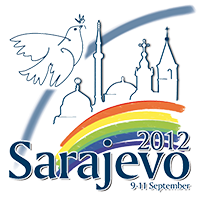
Philosopher, University of Sarajevo
|
It turned out that the best thing that could happen to religion after the collapse of Yugoslav socialism, namely the famous Return of religion or Return to religion, coincided with the fulfillment of goals the local ethno-nationalist separatism strived for. This coincidence of goals could be described most simply as follows: to rebuild and re-create an ethnic group as if it is a faith community, to tear apart the Socialist community of citizens along the lines of religion.
Besides military campaigns and similar violent strategies, how was it possible for the nationalists to achieve their goal of ethnic divisions by simply allowing to religious authorities to perform their own duties and promote their own goods in the climate of democratic change, without imposing any particular political demands upon them? A kind of synergy happened without a special need for collaboration between the two. Might it be that the powerful return of religion in a multiethnic society necessarily leads to division of that society? I am inclined to believe that only a long-term, for almost half century, separation between religion and state-politics, could make local religious authorities, and even whole faith communities, completely isolated from each other.
Under the pressure of the anticlerical regime, individuals were suffering from isolation: believers from the same faith community were isolated one from another or were united in a sectarian way – but they did not form a true community. Subsequently, after the collapse of socialism and the return of religion, each faith community started its renewal separately, i.e. in mutual isolation. It turned out that the faith communities, deeply immersed in their own affairs, were not able to support reintegration of Bosnian-and-Herzegovinian society. It was their own faith that separated the given community of believers from others, from non-believers and those who do not share their religion.
However, war sufferings of neighbors impose specific moral imperatives. It was the ‘bare life’ (G. Agamben) of victims that put to the test virtues and dignity of each believer individually: by this ‘bare life’ I do not mean only a life marked by the war’s misery but also one not qualified by an adherence to ‘the only true (i. e. ‘our’) religion’. Helpless and endangered civilians caught on the enemy side which was, as a rule, marked by the flags of other religion, faced the believers, posed on the right side and committed to the just cause, with the question of the value of ‘bare life’. It seems that the believers who found safety and redemption in their victorious army and their community of faith showed not much concern for those who worshiped other Gods and had lost everything except their lives.
It was not the case that it was too little humanitarian aid done by church charities and religious organizations during the last war. What was actually problematic about it was its too narrow scope: Catholic aid to Croats, Muslim aid to Bosniacs, Orthodox Christian aid to Serbs. It is understandable and not surprising: in the time of the inter-ethnic war the channels of trans-ethnic cooperation are if not blocked than quit narrow, covered by the shadow of a mortal threat. Less understandable is unreadiness of clergy of all three major confessions to cooperate in the eve of the war. Still, there were good reasons for that as well: in the first days of democracy, they were wholly absorbed in the process of recreating their respective communities. However, what is not acceptable is that even today, more than fifteen years after the end of the war, the local religious leaders together with their parishioners remain trenched in their own life-and-spiritual-worlds.
Every citizen knows how serious the threat of definite partition of the country is. The current religious life in Bosnia and Herzegovina continues to be the best model of living separately: each in his own community. The fact that after the return of religion the boundaries of the major ethnic communities nearly overlap with the boundaries of faith communities raises serious worries about the prospects of living together in the same society. It is for that very reason of crucial importance that religious leaders finally accept a true political responsibility: the responsibility for the promotion of the common good of the society as a whole.
The moment the faith communities of Catholics, Muslims and Orthodox Christians were recreated and their representatives entered the scene of public life, there appeared a need not only for a inter-religious dialogue but for a true political commitment of religious authorities and devoted believers to the common good beyond specific ethnic barriers. Inter-religious dialogue has been continuously practiced in the post-war years and yielded tangible fruits. But its major goals have been dictated by the self-interest of each faith community. The coordinated action of all religious agencies has been primarily focused on bargaining with the state authorities over benefits they could provide to the involved faith communities. The major axis of the post-war inter-religious dialogue may be revealed along the line of confrontation between religion and state. It fits perfectly with a strict respect of the principle of separation of church and state.
However, a more courageous step has been needed for a long time. The leading religious authorities of the country should finally take much broader political responsibility. Indeed, it is a step towards politics in the true sense of the word. No wonder that many religious leaders are reluctant to undertake it. Many responsible politicians stand in their way. Particularly those who are very much committed to the common cause of Bosnian people. These politicians are against any form of interference between religion and politics. They propose a rigid form of secularism as a magic formula to solve the enigma of living together in Bosnia. They generally feel great nostalgia for the heydays of the past militant atheism. In the recent turn of events called ‘return of religion’ they see the opening of Pandora’s box.
So, at the present time, there is almost a full agreement and a kind of division of labor between leftist patriotic politicians and influential religious leaders. They both happily obey the rigid secularist command: keep religion out of politics. According to their shared view, typical of the past regime, politics means state politics, while the sphere of civil society, with its characteristic kind of civic, non-governmental politics, is totally overlooked or deliberately omitted. And this despite the fact that the recent rebuilding or re-socialization of the faith communities took place in the form of the rise of civil society.
Public campaigns and intense lobbying (including commenting politicians’ everyday work and important social events, like court’s decisions on war crimes) that many religious leaders do on behalf of their faith communities in the post-war era is by no means an apolitical business. Doing the similar things for the wellbeing and prosperity of the whole society is also by no means an unacceptable political involvement. The time has passed when the religious leaders could be apolitical without remorse (‘apolitical’ meaning here: ‘without any concern either for well-being or suffering of the members of other faith communities’).
It is a high time for religious authorities to assume the burden of political responsibility for the whole society and not only for their respective ethnic and faith communities. Hence, the most important political question of the current religious life in Bosnia might be: Why should they do it? Or: Why shouldn’t they do it?
The first step in overcoming the inherited apolitical attitude in the domain of religion might be to pose the redemption of ‘bare life’ above the values of a comfortable life lodged in a ‘true religion’.
|

